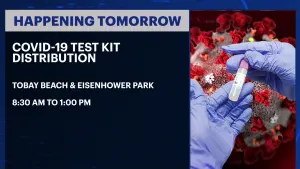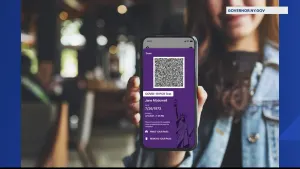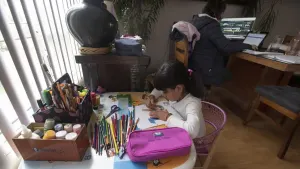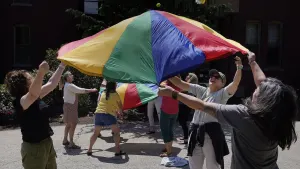13 tips to reduce your risk of getting sick while using public transit
The Centers for Disease Control and Prevention has released tips on how to protect yourself when using transportation.
•
Jun 17, 2020, 3:11 PM
•
Updated 1,846 days ago
Share:
More Stories
0:26

At-home COVID-19 test kits to be distributed at 2 Nassau locations this weekend
1,276ds ago0:23

New Excelsior Pass Plus app extends beyond New York jurisdiction
1,432ds ago
Your Coronavirus 2020 Photos
1,630ds ago
10 online learning tools for students to use at home
1,691ds ago11:21:40

6 tips for home schooling children and remote learning
1,691ds ago
7 online remote learning tools for educators
1,691ds ago0:26

At-home COVID-19 test kits to be distributed at 2 Nassau locations this weekend
1,276ds ago0:23

New Excelsior Pass Plus app extends beyond New York jurisdiction
1,432ds ago
Your Coronavirus 2020 Photos
1,630ds ago
10 online learning tools for students to use at home
1,691ds ago11:21:40

6 tips for home schooling children and remote learning
1,691ds ago
7 online remote learning tools for educators
1,691ds agoAs states begin to reopen businesses, travel on mass transit is a major concern for many people.
The Centers for Disease Control and Prevention has released its long-awaited tips for minimizing everyday risks of getting and spreading COVID-19, including tips on how to protect yourself when using transportation.
MORE: Read about the 15 questions to ask yourself before venturing out during the COVID-19 pandemic here
These are 13 tips on how to protect yourself when using transportation:
1 - Before you leave, wash your hands with soap and water for at least 20 seconds or use hand sanitizer with at least 60% alcohol.
2 - Don't touch your face, whether you are on or off public transit. The CDC recommends not touching your eyes, nose, or mouth.
3 - Limit touching frequently touched surfaces such as kiosks, digital interfaces such as touchscreens and fingerprint scanners, ticket machines, turnstiles, handrails, restroom surfaces, elevator buttons, and benches as much as possible. If you must touch these surfaces, as soon as you can, wash your hands for 20 seconds with soap and water or rub your hands with sanitizer containing 60% alcohol.
4 - Use touchless payment and no-touch trash cans and doors when available. Exchange cash or credit cards by placing them in a receipt tray or on the counter rather than by hand, if possible.
5 - Carry hand sanitizer and use it the moment you exit the bus, train, or subway.
6 - Once you reach your destination, wash your hands again with soap and water for at least 20 seconds or use hand sanitizer with at least 60% alcohol as soon as possible upon arrival.
7 - Cover your coughs and sneezes with a tissue or use the inside of your elbow. Throw used tissues in the trash and wash your hands immediately with soap and water for at least 20 seconds or use hand sanitizer with at least 60% alcohol.
8 - If someone is coughing or sneezing, immediately move as far away from them as possible.
9 - Practice social distancing. During travel, try to keep at least 6 feet (2 meters) from people who are not in your household — for example, when you are waiting at a bus station or selecting seats on a train.
10 - Wear a face covering when social distancing is not possible.
11 - Don't use your phone while taking public transit and wipe your phone down with an antibacterial wipe several times a day.
12 - Stay home when appropriate. People who are sick, or have recently had a close contact (closer than 6 feet for at least 15 minutes) to a person with COVID-19 should not use public transportation and should stay home except to seek medical care.
13 - Have adequate supplies. Be traveling, pack sanitizing wipes and hand sanitizer with at least 60% alcohol (in case you are unable to wash your hands at your destination). Bring your cloth face covering to wear at times when physical distancing is difficult - for example, while riding on a train or bus, waiting at a rest stop, or riding in a car with people outside your household.
For more recommendations, click here.
More from News 12
1:28

5 simple steps for long-term benefits to your health and heart
1:32

8 tips for working safely during hot weather
3:31

Guide: Ways to set your child up for financial success
3:18

Guide: The importance of good sleep and how to get it

Guide: Mental health resources available in the tri-state
9:36
